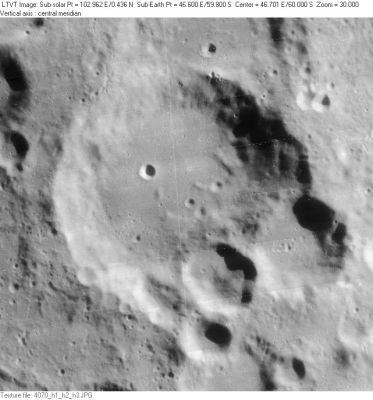Hagecius
Contents
Hagecius
|
Lat: 59.8°S, Long: 46.6°E, Diam: 76 km, Depth: 3.97 km, [/R%C3%BCkl%2075 Rükl: 75] |
Table of Contents
[#Hagecius Hagecius]
[#Hagecius-Images Images]
[#Hagecius-Maps Maps]
[#Hagecius-Description Description]
[#Hagecius-Description: Elger Description: Elger]
[#Hagecius-Description: Wikipedia Description: Wikipedia]
[#Hagecius-Additional Information Additional Information]
[#Hagecius-Nomenclature Nomenclature]
[#Hagecius-LPOD Articles LPOD Articles]
[#Hagecius-Bibliography Bibliography]

LO-IV-070H The pair of relatively large craters overlaying the southeast rim of Hagecius are 24-km Hagecius C (left) and 34-km Hagecius B (right). In the north, Hagecius itself overlays 61-km Hagecius A.
Images
LPOD Photo Gallery Lunar Orbiter Images Apollo Images
Maps
([/LAC%20zone LAC zone] 128D1) USGS Digital Atlas PDF
Description
Description: Elger
([/IAU%20Directions IAU Directions]) HAGECIUS.--The most easterly member of the [/Vlacq Vlacq] group of formations. It is situated on the S.E. of [/Rosenberger Rosenberger], and is about 50 miles in diameter. The rampart on the W. is continuous and of the normal type, but on the opposite side is broken by a number of smaller rings.
Description: Wikipedia
Additional Information
- Depth data from [/Kurt%20Fisher%20crater%20depths Kurt Fisher database]
- Westfall, 2000: 3.97 km
- Cherrington, 1969: 2.28 km
- Satellite craters Hagecius K is [/radar%20bright radar bright] at 70 cm.
Nomenclature
- Named for Thaddaeus Hayek (December 1, 1525 - September 1, 1600), the personal physician of the Holy Roman Emperor Rudolph II and a Czech astronomer. He published his studies of a supernova in the constellation Cassiopeia in 1572. Hayek was in frequent scientific correspondence with the recognized astronomer [/Tycho Tycho] Brahe and played an important role in persuading Rudolph II to invite Brahe (and later [/Kepler Kepler]) to Prague.
- According to [/Whitaker Whitaker] (p. 212) this name was originally introduced on [/Riccioli Riccioli]'s map; however Riccioli used it to label the feature we now call [/Hommel Hommel]. Whitaker does not explain when or how the name became associated with the present feature.
LPOD Articles
Bibliography
This page has been edited 1 times. The last modification was made by - tychocrater tychocrater on Jun 13, 2009 3:24 pm - afx3